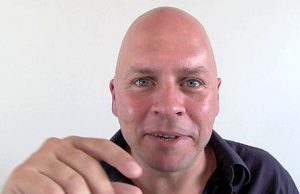 The clock ticked over to a new year … so WHAT are you and your business going to do differently in 2013?
The clock ticked over to a new year … so WHAT are you and your business going to do differently in 2013?
‘War stories’ from successful entrepreneurs like Derek Sivers are powerful because they can also help us figure out WHY we’re doing what we’re doing. In the first of an occasional series, Hugh Mason dissects the insights Derek has published to look for questions that could prompt useful New Year resolutions.
Derek Sivers was originally a professional musician and circus clown. In 1998 he created CD Baby, which became the largest seller of independent music online, with $100M in sales for 150,000 musicians. Ten years on, Derek sold the business for $22M and gave the money he made to a charitable trust. His TED talks have been viewed over 5 million times and it has been a joy to know him as a personal friend and a friend of JFDI.Asia over the last year or so since he moved to Singapore.
Since Derek wrote a bestselling book about his experience, many more people have got the chance to know him. Anything You Want is a great read because everything in it comes from personal experience: there’s no pontificating or abstract theory. It helps that he’s ruthlessly honest about when things went wrong, how he learned from his mistakes and came out stronger.
 Anything You Want is an unusual book because it’s designed to be read in an hour yet it manages to makemore than fifty incredibly useful lessons that Derek learned entertaining at the same time. It follows in a long tradition of first-hand accounts of start-up success, like Rework from the 37 Signals team or Do More Faster from the guys behind TechStars.
Anything You Want is an unusual book because it’s designed to be read in an hour yet it manages to makemore than fifty incredibly useful lessons that Derek learned entertaining at the same time. It follows in a long tradition of first-hand accounts of start-up success, like Rework from the 37 Signals team or Do More Faster from the guys behind TechStars.
The value of books like this is their immediacy. You’re hearing from people who have been at the front line. Yet the challenge for many of us is: how can I apply it to my own life?
So we have decided to make this the first in an occasional series when we dissect a book that seems to hold powerful lessons for start-ups, listing the questions it has prompted us to ask ourselves. What follows is just our interpretation, so please comment, challenge it and share your own insights.
If you’re new to Sivers-ology then do take a peek at Derek’s book, blog or videos too because our list of key points doesn’t begin to do justice this wonderful, warm and wise man. Happy New Year!
| Derek’s Wisdom | So How? |
|
What makes each of the team happy and what does everyone feel is worth doing? |
|
Once you get started, take time to re-evaluate. What do our customers really want, enough to pay for? |
|
Who are we consciously excluding? |
|
How are we going to become unnecessary to the running of the business? |
|
Who are we doing this for? What would be their dream-come-true deal? |
|
Who are our role-models that we can learn from? |
|
Are we being fair to everyone, including ourselves, in the deal we offer? |
|
What is it that we do that people like so much? |
|
What do people really, really like about what we are doing? |
|
What are the bits of what we do that are not working? Let’s dump them. Today. |
|
Where does it feel like we are banging our heads against the wall? Shall we stop that right now? |
|
Do we actually want to do all that we are committing ourselves to do? |
|
Is there a risk that we get too driven by the priorities of investors who don’t really share our passion for making ideas real? |
|
Who are our customers? What problems are we really solving for them? How can we give them more, so they want to give us more? |
|
What can we do today to get started, with what we have to hand, rather than what we would like to have? |
|
What can we test and understand, armed with the limited resources we have? |
|
How can we start making a profit, however small, without laying out a load of cash or raising a ton of money first? |
|
Make a list of all the things we have achieved already and celebrate it. |
|
Is there anything we are doing which is meaningless ass-covering? |
|
Are we being dicked around by a bully? How can we drop them? |
|
What is the optimum number of clients of what size for us? |
|
Can we pass on the clients we don’t want to help to someone who can help them? |
|
Are we trying to hang on someone else’s success when we should be building our own? |
|
What are the top 3 things that every one of our customers wants? |
|
Who do we want to shut out? |
|
Are we getting distracted into earning small amounts of money and compromising on what’s really valuable? |
|
Are there ways to ‘re-frame’ the core of what we do that might be better? |
|
Who are we trying to help? How can we help them today? |
|
What are the three key metrics we should look at every month to know we are on course?
|
|
If we achieve success, how will we know we have done it? Can we measure our path along the way? |
|
Do we really like the customers we are working with? |
|
How can we create something that our customers want to give us money for, rather than something we have to try and sell to them? |
|
Have we over-reacted to any bad experiences? |
|
We get so many people contacting us and liking us on Facebook. Instead of seeing that as a chore, how can we do something for every one of them, and have them do something for our community in return? |
|
We have a shedload of words on our website. Maybe we should try and hack it all down. Because right now people aren’t reading it. |
|
What can we do that puts fun into our offering? |
|
How can we make it easy for someone who asks us for something we can’t charge for to do something for us in return? |
|
Is the way we work shaped by old habits of looking for someone to give us a gold star? |
|
How are we different? |
|
Are we planning to maximise or success, or restricting ourselves by planning to minimize the downside? |
|
Let’s keep the stuff we enjoy in house. |
|
Let’s always know what we are promising and make sure we can deliver it |
|
Have we got someone on the team who’s looking at all the details? |
|
How do we capture our know-how and share it with new team-members as we grow? |
|
How can we hire people who enjoy running things when we as founders are best at starting things? |
|
What do we hate doing? Who can we find who loves doing it? |
|
Do we really want to run a massive empire? What feels comfortable? |
|
What makes us all happy? |
|
Are we allowing enough time to supervise the people who join us and to help them learn to do things right? |
|
How can we involve and motivate everyone as we grow, without setting up unrealistic expectations of shared decision making? |
|
There will be challenges with staff and perhaps with each other as we grow the business. We have to address those before they poison us. If that means letting people go, we should do it. |
|
Maybe we should view this business from the start as a stepping stone for each of us, as something we are doing to move on from, not something we are going to do forever. |
|
What is enough for each of us? Let’s talk about that frankly so we understand each other. |
|
Could we write a press release now dated the day that we sell the business to help visualise what we are all aiming to achieve? |
|
Can we help each other be consistent and true to our purpose? |
|
How big do we really want to be? Could we hand over the business beyond that point? |

